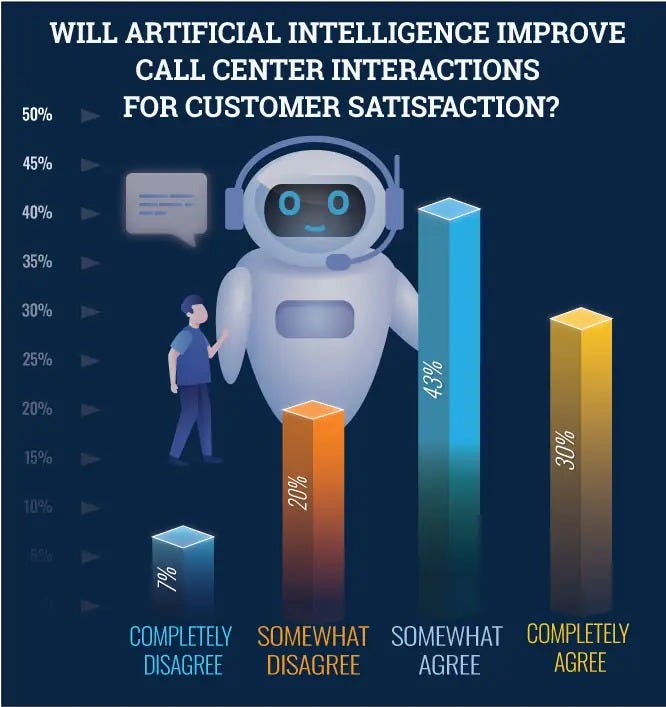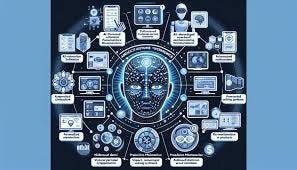101 Ways to How AI Transforms Customer Service Globally in 2024




Introduction
Artificial Intelligence (AI) is transforming industries worldwide, and customer service is no exception. In 2024, AI’s impact on customer support is evident across multiple touchpoints, from chatbots and virtual assistants to predictive analytics and personalized experiences. This transformation aims to create more efficient, personalized, and accessible customer interactions on a global scale. As businesses continue to adopt AI, customer service is evolving rapidly, offering both exciting opportunities and important challenges.
Overview
AI’s integration into customer service involves the use of machine learning, natural language processing (NLP), and automation to handle customer inquiries, streamline processes, and enhance customer satisfaction. AI-powered systems can provide 24/7 support, offer instant responses, and resolve complex issues with little human intervention. Whether it’s through AI chatbots, voice assistants, or advanced self-service portals, AI is redefining how companies communicate with their customers.
Importance
AI’s significance in customer service lies in its ability to provide immediate, efficient, and personalized support. In a world where customer expectations are higher than ever, businesses can no longer afford delays in response or impersonal interactions. AI allows companies to meet these expectations by reducing wait times, offering tailored solutions, and ensuring a seamless customer experience. This not only boosts customer satisfaction but also improves brand loyalty, drives growth, and optimizes operational efficiency.
Future Trends
The future of AI in customer service will be shaped by several key trends:
- Conversational AI: With advances in NLP, AI systems will become more conversational, simulating human-like interactions with customers.
- Emotional AI: AI will increasingly be able to detect and respond to customer emotions, offering more empathetic support.
- Hyper-Personalization: AI will use data to create even more personalized customer journeys, anticipating customer needs.
- AI-Powered Virtual and Augmented Reality: AI will enhance customer interactions through immersive experiences, such as virtual product demos or troubleshooting in augmented reality.
- AI and Quantum Computing: The integration of quantum computing could lead to even faster and more efficient AI solutions for customer service.
Strategies
To effectively implement AI in customer service, businesses need to develop robust strategies:
- Customer-Centric AI Design: AI tools should be designed with the customer in mind, focusing on ease of use and accessibility.
- Balanced Automation: While AI can automate many tasks, companies must strike a balance between automation and the need for human agents to handle complex or sensitive issues.
- Training and Integration: Customer service teams need to be trained on AI tools to ensure seamless integration between AI and human interactions.
- Continuous Improvement: AI systems should be continually updated and refined based on customer feedback and emerging technology trends.
- Ethical AI: Ensuring fairness, transparency, and privacy in AI-driven customer service is essential for maintaining trust.
Ethics
The ethical implications of AI in customer service are critical. AI systems must be designed to ensure:
- Transparency: Customers should know when they are interacting with an AI versus a human agent.
- Data Privacy: Personal customer data used by AI must be protected according to privacy regulations like GDPR.
- Fairness: AI systems should not discriminate against any group of customers based on biased algorithms.
- Accountability: Companies must be accountable for the decisions made by AI systems, particularly when they affect customer experiences or outcomes.
Causes
The rapid adoption of AI in customer service is driven by several factors:
- Increasing Customer Expectations: Customers now demand faster, more personalized, and round-the-clock service.
- Technological Advancements: Innovations in AI and machine learning have made it possible to automate more complex customer interactions.
- Cost Efficiency: AI reduces operational costs by automating routine tasks, allowing human agents to focus on more complex problems.
- Competitive Pressure: Businesses are adopting AI to stay competitive in a market where customer service quality is a key differentiator.
Effects
The effects of AI on customer service can be seen in both positive and negative lights:
- Positive Effects:
- Enhanced customer satisfaction due to quicker responses.
- Improved efficiency through automation.
- Better personalization, leading to more relevant customer experiences.
- Cost savings and optimized resource allocation.
- Negative Effects:
- Job displacement for customer service representatives as AI takes over routine tasks.
- Reduced human interaction, which could alienate some customers.
- Privacy concerns due to the vast amounts of data AI systems require.
Solutions
To address these challenges, businesses can:
- Upskill Workers: Train customer service teams to work alongside AI, focusing on handling complex and emotional interactions that require human empathy.
- Transparent Communication: Be clear with customers about when they are interacting with AI and how their data is being used.
- Maintain a Human Touch: Even with AI in place, ensure that human agents are available for more sensitive or personalized interactions.
- Data Protection Measures: Invest in robust data security protocols to safeguard customer information.
Regulation
Governments and regulatory bodies are increasingly focusing on AI’s role in customer service:
- Data Privacy Laws: Regulations like the GDPR in Europe and the CCPA in California require businesses to protect customer data and ensure consent is obtained.
- AI Transparency: Laws may evolve to require companies to disclose when AI is being used in customer service.
- Ethical AI Frameworks: Governments are pushing for ethical AI frameworks that promote fairness, accountability, and non-discrimination in automated decision-making.
Pros
In 2024, AI is dramatically transforming customer service by optimizing processes, enhancing personalization, and improving customer satisfaction. Here are 101 ways AI is revolutionizing customer service globally:
1–10: Chatbots and Virtual Assistants
- 24/7 Availability: AI-powered chatbots offer round-the-clock customer support.
- Instant Responses: Chatbots respond immediately to customer queries, reducing wait times.
- Multilingual Support: AI bots provide customer service in multiple languages.
- Proactive Assistance: AI predicts customer needs and offers help before they even ask.
- Conversational AI: Chatbots simulate human-like conversations for more natural interactions.
- Integration with Messaging Apps: AI integrates with apps like WhatsApp, Facebook Messenger, and WeChat for seamless support.
- Voice Assistants: AI assistants like Alexa or Siri handle customer queries via voice commands.
- Sentiment Analysis: AI detects emotions in customer conversations and adapts the response accordingly.
- Complex Issue Resolution: AI handles complex customer queries by providing detailed solutions based on data.
- Escalation Management: AI routes more complex issues to human agents when necessary.
11–20: Personalization
- Customized Recommendations: AI suggests personalized products and services based on customer behavior.
- Dynamic FAQ Generation: AI generates FAQs based on common customer inquiries and updates them in real time.
- Behavioral Profiling: AI builds detailed customer profiles to offer tailored responses and solutions.
- Product Suggestions: AI uses past interactions to recommend relevant products or services.
- Personalized Greetings: AI greets returning customers by name and offers personalized support.
- Tailored Promotions: AI identifies customer preferences and sends targeted promotional offers.
- Customer Journey Mapping: AI tracks customer interactions to create personalized journeys across channels.
- Personalized IVR Options: AI enhances IVR (Interactive Voice Response) systems by offering personalized menu options based on past interactions.
- Custom Service Plans: AI suggests custom service or support plans suited to the customer’s unique needs.
- Smart Routing: AI routes customers to the best support agent based on their profile and preferences.
21–30: Automation and Efficiency
- Automated Ticketing: AI systems automatically create and categorize customer support tickets.
- Predictive Maintenance: AI predicts issues before they happen and alerts the customer.
- Workflow Automation: AI automates repetitive tasks such as data entry and follow-up emails.
- Email Automation: AI crafts and sends automated responses to common customer queries.
- Process Optimization: AI identifies inefficiencies in customer service workflows and suggests improvements.
- Automated Returns Processing: AI automates the product returns process for quick and easy exchanges or refunds.
- Appointment Scheduling: AI handles appointment booking and scheduling for customers.
- Order Tracking: AI provides automated order updates and tracking information.
- Knowledge Base Management: AI automatically updates the company’s knowledge base with new solutions.
- Service Level Agreements (SLAs) Monitoring: AI ensures adherence to SLAs by monitoring response times and escalating overdue cases.
31–40: Omnichannel Support
- Unified Communication Platforms: AI merges data from email, chat, and social media into one platform for seamless customer service.
- Cross-Platform Support: AI provides consistent support across multiple channels (web, mobile, in-store).
- Social Media Listening: AI monitors social media for mentions of the brand and responds in real time.
- Omnichannel Ticketing: AI consolidates tickets from various channels into a single dashboard for easy management.
- Consistent Messaging: AI ensures consistent messaging across all platforms, maintaining brand tone.
- Multi-Device Support: AI assists customers across multiple devices (laptops, smartphones, tablets).
- Real-Time Channel Switching: AI allows customers to switch between chat, email, or phone calls without losing the conversation’s context.
- Social Media Customer Service: AI responds to social media comments or direct messages with quick, accurate responses.
- Text-Based Support via SMS: AI handles customer queries through SMS-based chat systems.
- Seamless In-App Assistance: AI offers help within mobile apps, guiding users through processes or troubleshooting issues.
41–50: Self-Service
- AI-Powered Knowledge Bases: Customers can access AI-driven self-help portals for quick answers.
- Interactive Tutorials: AI provides step-by-step tutorials based on customer needs.
- AI-Powered Search: Intelligent search engines improve the accuracy of customer self-service queries.
- Automated Troubleshooting: AI offers self-service troubleshooting based on customer inputs.
- Self-Service Portals: AI empowers customers to resolve issues independently through online portals.
- AI-Powered Forums: AI moderates and provides suggestions in online community forums.
- Virtual Product Demos: AI offers interactive product demonstrations to guide users.
- Voice-Activated Self-Service: Customers can interact with voice-activated AI systems to solve problems.
- DIY Returns: AI guides customers through self-service return processes.
- Interactive FAQs: AI updates FAQs dynamically based on user interactions and feedback.
51–60: Customer Sentiment and Feedback
- Real-Time Feedback Collection: AI gathers real-time feedback from customers during or after interactions.
- Sentiment Analysis on Feedback: AI assesses customer feedback for emotional context.
- Survey Automation: AI automates the delivery and analysis of customer satisfaction surveys.
- Emotion Recognition: AI detects customer frustration or satisfaction through voice or text analysis.
- Predictive Sentiment: AI predicts customer mood based on past interactions and adjusts responses.
- Social Sentiment Analysis: AI monitors social media platforms for sentiment related to brand mentions.
- Net Promoter Score (NPS) Tracking: AI automates the collection and analysis of NPS.
- Feedback Loop Automation: AI automatically follows up with customers to close the feedback loop.
- Real-Time Customer Insights: AI delivers real-time customer sentiment insights to support teams.
- Sentiment-Based Prioritization: AI prioritizes customer issues based on detected emotions.
61–70: Fraud Detection and Security
- Fraud Detection in Customer Interactions: AI identifies suspicious patterns in customer interactions.
- Authentication via AI: AI uses biometric data for secure and seamless customer verification.
- Voice Authentication: AI verifies customer identity through voice biometrics.
- Fraud Alerts: AI detects and flags potential fraud attempts during customer interactions.
- Secure Transaction Monitoring: AI monitors for irregularities in transactions, enhancing security.
- Two-Factor Authentication: AI helps implement secure authentication processes during customer service interactions.
- Data Privacy Compliance: AI ensures that customer interactions comply with data privacy regulations (e.g., GDPR).
- Anomaly Detection: AI detects unusual patterns in user behavior to prevent fraud.
- Real-Time Security Updates: AI provides real-time updates on security vulnerabilities.
- Proactive Security Solutions: AI suggests security improvements to customers based on their usage patterns.
71–80: Predictive Analytics and Insights
- Predictive Customer Behavior: AI anticipates customer needs based on historical data.
- Churn Prediction: AI identifies customers at risk of leaving and suggests retention strategies.
- Sales Forecasting: AI predicts future sales opportunities based on customer interactions.
- Customer Lifetime Value (CLV) Prediction: AI estimates the long-term value of customers.
- Cross-Sell and Upsell Opportunities: AI predicts when customers may be interested in additional products.
- Personalized Offers via AI: AI generates offers based on customer purchasing patterns.
- Customer Service Trends: AI analyzes data to forecast future customer service trends.
- Predictive Staffing Needs: AI forecasts staffing requirements based on expected customer inquiries.
- Performance Insights: AI tracks customer service agents’ performance and provides actionable insights.
- Customer Segmentation: AI creates customer segments based on behavior and preferences for targeted services.
81–90: Cost Reduction and Resource Optimization
- Cost-Effective Automation: AI reduces operational costs by automating repetitive tasks.
- AI-Driven Resource Allocation: AI optimizes staffing and resource allocation based on predicted demand.
- Reduced Training Costs: AI provides self-learning tools that reduce the need for extensive employee training.
- Energy Efficiency: AI optimizes energy consumption in customer service centers.
- Automated Data Entry: AI reduces human error and time spent on manual data entry tasks.
- Agent Assistance: AI assists human agents with real-time suggestions, reducing handling time.
- Call Deflection: AI deflects calls to automated channels, lowering the overall call volume for human agents.
- Dynamic Pricing: AI helps businesses adjust pricing based on demand, improving profit margins.
- Support Cost Prediction: AI predicts future customer support costs, allowing for better budgeting.
- Optimized Chatbot Costs: AI chatbots reduce the need for live agents, cutting down customer service expenses.
91–101: Advanced Technologies and Future Trends
- AI and Blockchain for Secure Transactions: AI ensures transparent and secure customer interactions using blockchain.
- AI-Powered Voice Transcription: AI provides real-time transcription of customer calls for analysis.
- Advanced Natural Language Processing (NLP): NLP improvements allow AI to understand and process complex queries more efficiently.
- Deep Learning for Customer Insights: AI uses deep learning to identify long-term trends in customer behavior.
- Quantum Computing in AI: Faster problem-solving through quantum AI for customer service optimization.
- Emotional AI (Affective Computing): AI systems detect and respond to customer emotions in real time.
- Hyper-Personalization: AI personalizes every aspect of customer interaction for unique experiences.
- Digital Twins: AI creates virtual models of customers or systems for better service predictions.
- AI and 5G for Real-Time Support: 5G enables AI to offer real-time support with ultra-low latency.
- AI in Virtual Reality (VR) Customer Service: AI enables immersive VR experiences for product demos and troubleshooting.
- Holographic Customer Support: AI enables holographic representations of customer service agents for highly interactive support.
In 2024, AI’s influence on customer service will span from basic automation to advanced predictive analytics, redefining global customer service interactions.
Pros
- Efficiency: AI automates repetitive tasks, reducing operational costs and boosting productivity.
- Personalization: AI can provide highly tailored responses and recommendations, improving the customer experience.
- Scalability: AI can handle large volumes of customer queries, allowing businesses to scale support without needing additional staff.
- 24/7 Availability: AI-powered systems ensure customer support is always available.
Cons
- Job Losses: Automation could lead to the displacement of customer service roles.
- Lack of Empathy: AI lacks the emotional intelligence needed for handling sensitive issues.
- Bias in Algorithms: If not carefully designed, AI can reflect and amplify biases in decision-making processes.
- Privacy Concerns: The extensive use of personal data in AI raises concerns about how customer data is stored and used.
Summary
In 2024, AI is revolutionizing customer service by automating tasks, providing personalized experiences, and improving efficiency. However, while AI brings significant benefits, it also poses ethical concerns, particularly around data privacy, job displacement, and transparency. Businesses must adopt thoughtful strategies, balancing AI’s potential with the need for human empathy, fairness, and security.
Conclusion
AI is undoubtedly the future of customer service, offering unparalleled opportunities for enhancing customer satisfaction and operational efficiency. However, companies must ensure that they implement AI responsibly, prioritizing ethical considerations and maintaining a human touch where necessary. By doing so, AI will continue to reshape the customer service landscape in a way that benefits both businesses and consumers.
Thank You
Thank you for taking the time to explore how AI is transforming customer service globally in 2024. With continuous advancements and thoughtful implementation, the future of customer service looks brighter and more dynamic than ever.


